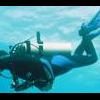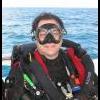Shallow water blackout is actually something different. Yes, holding breath for too long could cause one to black out in shallow water or even in open air. However, the term "shallow water blackout" connotes something different.
Normally, there is a certain amount of carbon dioxide in the lungs. Your lungs have strong sensors built into them that monitor the level of carbon dioxide. When the CO2 level gets too high, these sensors send a message to the brain, instructing the brain to breathe.
Your body also monitors oxygen levels, and will also send a message to the brain for it to instruct the lungs to breathe. However, the oxygen sensors to not control the breathing nearly as much as the CO2 sensors do. Only when oxygen levels get pretty critically low do the oxygen sensors kick in when compared to the CO2 sensors.
By hyperventilating before doing a free dive, the skin diver is removing the carbon dioxide from the lungs by breathing faster than the body can manufacture it (as well as breathing deeper, allowing a better exchange deeper in the lungs). So, after the skin diver hyperventilates, the CO2 levels take a while to come back to the point where the sensors trigger a message to the brain that it is time to take a breath. This delays the urge to breathe.
After hyperventilating, when the free diver descends, the oxygen partial pressure in the lungs rises, compacting lots of oxygen molecules together. The body gets plenty of oxygen. In fact, initially, it gets more than it does at the surface due to more molecules entering the bloodstream. So, the oxygen alarms are kept from firing.
Since the body is used to dealing with oxygen in normal atmospheric pressure, the oxygen alarms do not trigger when the percentage of oxygen in the lungs starts to drop. This is because the few molecules of oxygen that are left are compacted together so tightly that the body is receiving enough oxygen to sustain life. In other words, the fraction of gas will become too low to support life at the surface but it will be fine at depth. (This is why partial pressure is not the same thing as gas fraction. You can have a very low fraction of oxygen but put enough pressure around it to compact the molecules tightly enough together to sustain life. This is why deep trimix contains low fractions of oxygen, otherwise known as hypoxic mixes.)
However, by this time, the carbon dioxide is starting to build up to the point where this alarm is now activated, prompting the urge to breathe. So, the diver starts to ascend. During this ascent, what is happening to the oxygen in the lungs? The partial pressure drops. In fact, it can get so low that it is insufficient to sustain consciousness. By the time the oxygen alarm goes off, it is too late. The brain, deprived of oxygen, blacks out.
Since the blackout happens as the diver is ascending through the shallows, the event has come to be known as "shallow water blackout."
Edited by ScubaDadMiami, 25 December 2005 - 11:27 PM.





















